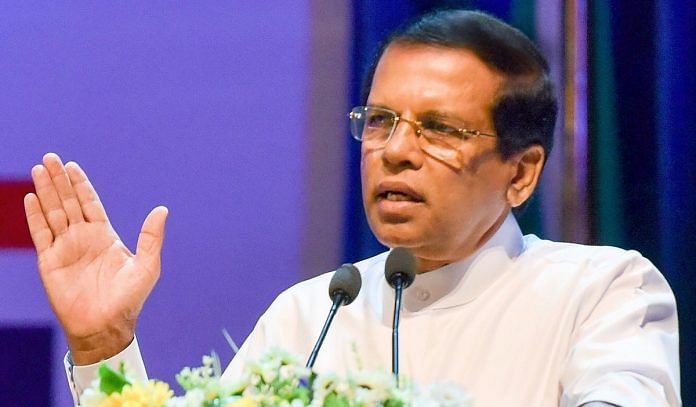Testimony to a Parliamentary Select Committee currently looking into the Easter bombings has already painted Sri Lankan President Maithripala Sirisena in a very unfavourable light. In that context, Sirisena recently demanded that the committee be suspended and threatened to “boycott all government activities and meetings” until his demand is met. Sirisena dismissed the nation’s chief of national intelligence, Sisira Mendis, after hearing his testimony. He also decided not to hold a cabinet meeting last Tuesday. Nonetheless, the PSC is, quite rightly, still moving ahead. Information coming out of the probe and the President’s reaction is another reminder of Sirisena’s incompetence, fecklessness and toddler-like tendencies.
The Easter bombings in Sri Lanka were an awful tragedy. President Sirisena spent the days following the attacks eschewing any responsibility for the security lapse. He leads the country, but claims he didn’t see the intelligence briefings. He had no knowledge of an impending attack. The President is in charge and in control except for all the times when he isn’t. The President would be happy to own the political victories, if there were any, but he is not going to hold himself accountable for any failure. Sirisena just keeps reminding the people of Sri Lanka that his tenure has been a disaster and that he’s totally unsuited to lead the country.
Worse, Sirisena’s dreadful track record has paved the way for an authoritarian revival.
Sirisena’s infantile behaviour has been impossible to ignore for some time. He is erratic, petty and self-absorbed. He eschews responsibility at every turn. He has no leadership qualities and has been out of his depth since January 2015, when he unexpectedly defeated the increasingly authoritarian and corrupt Mahinda Rajapaksa.
Also read: Rajapaksa’s dark legacy looms large over Sri Lanka and won’t clear anytime soon
And let’s not forget about the political crisis last year; Sri Lanka’s President led an attempted coup. Sirisena illegally appointed Rajapaksa as the Prime Minister. Chaos and uncertainty permeated the nation for more than seven weeks. Fortunately, the coup failed. However, Sirisena and Rajapaksa did considerable damage to Sri Lanka’s already complicated and flawed democracy. The economy and tourism took big hits and some of that pain will continue to be felt. More generally, the coup attempt tarnished the reputation of a president whose reputation was already in terrible shape.
By attempting to install Rajapaksa as Prime Minister, Sirisena was hoping to preserve his own political future. The President regularly prioritises petty and partisan political considerations over the wellbeing of the nation.
During a recent cabinet meeting, Sirisena said that he would not run for president again. With a vote due later this year, it’s hard to take Sirisena at his word or know exactly what he is thinking. If he doesn’t run, it’s because he finally sees no chance of winning (and he doesn’t have a chance of winning). “Nobody likes the President,” a Colombo-based human rights activist tells me.
In the wake of Sirisena’s obvious incompetence, the failures of coalition governance, the Easter bombings, and the government’s awful response to the attacks, calls for more centralised rule are growing and will continue to grow. From 2005 to 2015, Rajapaksa took the country in a perilous direction. Yes, he won the government’s civil war against the separatist Tamil Tigers. However, he greatly damaged the country’s institutions, alienated minority communities, and pushed the island nation towards the brink of autocracy.
Also read: Sri Lanka terror attacks can help Rajapaksa use wartime credentials for political gains
Gotabaya Rajapaksa served as Secretary to the Ministry of Defence during Mahinda Rajapaksa’s presidency. Five days after the Easter bombings, Gotabaya said he would run for president. Irrespective of whether he becomes an official candidate or not, whoever Mahinda and his allies back is poised to take the presidency.
The President’s performance has been worse than anyone could have expected. As he continues to politicise the Easter attacks and their fallout, and absolve himself of wrongdoing, Sri Lankan voters are reminded yet again that a serious course correction is long overdue. But let’s be clear: a Rajapaksa resurgence to the highest levels of power would be extremely dangerous.
The author is an Adjunct Fellow at Pacific Forum. Follow him on Twitter @taylordibbert. Views are personal.




For any normal President, the loss of 250 lives should weigh heavy on a man’s conscience. Indian agencies were sharing valuable, actionable intelligence for a long time, the last tip off early on the morning of the attacks. A Mahinda Rajapaksa who balances between the core interests of India and China, as PM Sheikh Hasina of Bangladesh does, would probably be Sri Lanka’s best option.